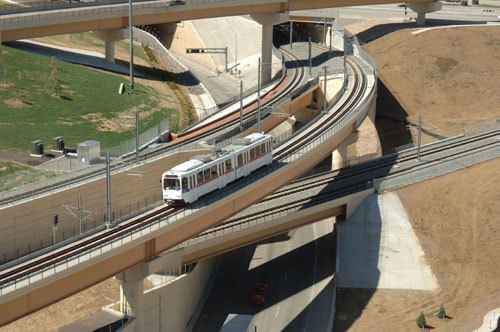Voters in Orange County, North Carolina, will decide the fate of a nearly $1.4 billion light rail project for Durham and Orange Counties in the Nov. 6 general election.
In a 5-2 vote in June, the Orange County Board of Commissioners approved placing a half-cent sales tax increase referendum on the ballot to pay for the 17.3-mile rail line project. The line would run from the University of North Carolina campus in Chapel Hill to East Durham along N.C. Highway 54.
The plan includes expanded bus service.
Voter approval of the sales tax would trigger implementation of a similar tax in Durham County. Voters there approved the sales tax in 2011, but county commissioners said they would not levy it until either Orange or Wake counties voted to participate in the project.
Unlike Democrat-dominated county commissions in the other two counties, Wake’s majority Republican board appears unlikely to put the measure on the ballot.
Rural vs. City
The vote again punctuated the political chasm between conservative rural Orange County voters and the liberal Chapel Hill-Carrboro orb.
In a public hearing before the vote, residents accused commissioners of owing elective allegiance to the larger liberal voting bloc, being fiscally reckless and following United Nations Agenda 21, a “smart-growth” sustainability model that critics say is an anti-capitalist, radical environmentalist mechanism to usher in global socialism.
But even one environmental-minded group, the influential grassroots Orange County Voice, is balking at light rail.
“As long as light rail remains the cornerstone of the plan we will oppose it,” Bonnie Hauser, the group’s president, told commissioners. “It’s too much money for a single rail plan” that clumsily patches a light rail line to bus and commuter rail connections serving a small area and few residents. Expanded bus service makes more sense, she said.
Orange Commissioners Earl McKee and Steve Yuhasz opposed putting the sales tax up for a vote. They cited the high cost of light rail and the disparity between service for northern Orange County and the Chapel Hill-Carrboro area. They support expanded bus routes.
Fuzzy Plan
They also characterized the vote as premature because an implementation plan has yet to be finalized.
Indeed, the commissioners spent a great deal of the three hours leading up to the vote drilling deep into details of the proposed agreement among the various transit partners and Durham County. They debated insertion of even a word or phrase into a confusing series of amendment motions, friendly amendments to motions and withdrawal of others.
McKee said he was deeply troubled by the “lack of a definitive implementation plan. It is not ready, it is not completed, there are still lines that are blank” and deep disagreements remain unresolved among partners.
Yuhasz said the original plan has deteriorated and is no longer viable.
“This whole thing started as a regional plan” but no longer maintains that scope without Wake County, Yuhasz said.
“We can talk about the details of this particular implementation,” he said. “But in the end we’re going to end up with a plan that is too expensive, provides too little overall service, and I don’t know how we can improve on that at all.”
Studied, Debated, Negotiated
But the majority of commissioners said the plan has been studied, debated and negotiated for years, and it was time for a vote.
“There are complications,” said Commissioners Chairwoman Bernadette Pelissier. “To me it doesn’t really help the public understand the plan any better” by having every negotiating point finalized. “Details sometimes don’t help people understand” as much as telling the public what the essence of the project is. There will be time after the plan is passed to help educate voters, she said.
“I think it is time to take it to the voters,” agreed Vice Chairwoman Pam Hemminger. She said the plan’s concept of preparing for population growth and transportation needs is more important than specific numbers because there is no way to foretell what “true costs are going to be.”
“This plan will only go forward if the public decides to pay for it,” said Commissioner Valerie Foushee.
Some Compromise
Despite a partial compromise, Yuhasz and McKee still voted against the referendum.
The compromise directed county staff to work with transit plan partners to resolve lingering implementation plan questions by commissioners’ Aug. 21 meeting. The referendum will be put on the ballot, with a statement of intent that the county will not authorize Triangle Transit Authority to levy the sales tax until satisfactory agreements are reached on the implementation document.
Triangle Transit would be the revenue collection agency under provisions of the state law that allows for the half-cent sales tax to be levied. It would manage, build and operate the system. Smaller revenue streams would come from vehicle registration fees and rental car taxes.
Republican Orange County Commissioner candidate Chris Weaver assailed the vehicle registration fees. Half of the vehicles registered in Orange County are outside Chapel Hill and Carrboro, in areas where only “token service” will occur under the transit plan, he said.
He called the light rail “a Duke and UNC employee shuttle” that will be decided, in part, by “seasonal voters” enrolled at UNC.
“I think we’re all intimately aware of the population distribution of the county and the voting strength that the town of Chapel Hill has. If they want something they’re going to get it,” said Cedar Grove resident Jeff Schmidt.
Dan Way ([email protected]) is a contributor to Carolina Journal, where a version of this article first appeared. Used with permission.




